| The 1960s In
1960 we moved all plant, equipment and offices to Strawberry
Lane. Without doubt we were, at this period, getting 80% of
the U.K. reconditioning work, and were now exporting all over the world. For
example, Charles Nielens was our agent in Belgium; William Jacks was our
agent in Singapore, looking after Singapore, Malaya, Sumatra, Borneo,
Siam, Hong Kong and the Philippines. In India Mr. Hari Bhargava was
trading as Farm Equipment Limited in Kanpur. In collaboration with
Trackparts he formed a new company, Trackparts of India Limited.
|
 |
This company started life in a garage in Mr. Bhargava’s back garden
but a new factory was built at No. 4 Industrial Area, Govindnagar,
Kanpur. |
| It was fitted out with all British plant and laid out in exactly the
same way as at Tractor Spares, Wolverhampton.
They expanded year by year
and went public in 1977.
But in 1979 Mr. Hari Bhargava died
and our interests in India came to an end, though the Indian company
still flourishes. |
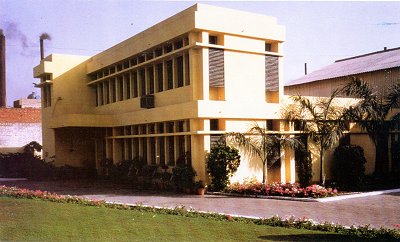
The Trackparts factory at Govindnagar.
|
|
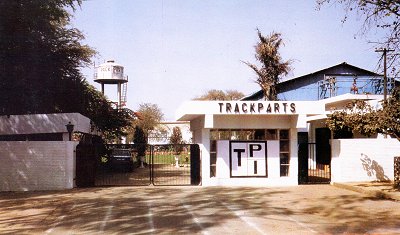
The Trackparts factory at Panki.
|
In the early 1960s we employed a Jamaican paint sprayer in our
reconditioning shop. He was a very friendly man. One
August Bank Holiday I gave him 50 shillings in his wage packet and
he was most appreciative.
For the past 15 to 20 years we have been receiving an annual
order for our spares for Caterpillars worth £10,000 to £20,000
and the goods are paid for in cash before shipment.
|
| The customer, a firm in Jamaica which operates a road stone
crushing plant and sugar cane plantations, is run by a Mr. Fred
Buchanan. It was not until 1992 that he told us why he
purchased all his requirements from Tractor Spares Limited. He was the paint sprayer I gave 50 shillings to. |
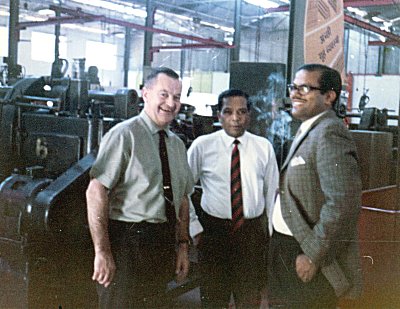
This snap was taken on a visit some years later.
|
 |
In 1962 we incorporated Tractor
Blades Limited. |
| In 1963 we had to shut down one of our track bush carburising
furnaces because of a shortage of steel. One day I noticed
this furnace was switched on and the carburising boxes were empty.
The furnace man told me the steel we had been waiting for had
arrived. But I was unable to locate the steel in the stock and
became suspicious. I returned to the furnace and, on opening
it, found four potatoes being baked. I estimated that £400 for
baking potatoes was too expensive. The furnace operator left
before his lunch was ready. |
| In 1964 I had a devastating brush with the unions. When
I refused Union recognition and sacked two shop stewards, 86
men walked out, even though they were, in fact, paid the
highest rates in the Midlands.
Eventually I re-instated the two men on condition that
there was no closed shop. But their attempts to enforce a
closed shop lead to constant strikes.
After 12 months of daily problems I took the same action
as many other firms had felt compelled to do. I closed the
manufacturing side and bought foreign goods from Singapore,
India and Italy. At the time I felt that I had been pushed
into a criminal decision. But things did not improve.
In 1969 there were more strikes in the reconditioning
plant. I sold the whole reconditioning side of the business
to Peter Strickland. Peter started to move the plant out,
while the men stood outside the gates, watching their jobs
disappear. |
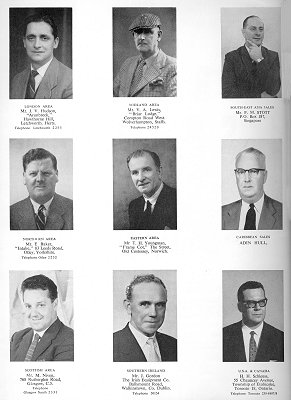
A page from our 1962-3 catalogue showing our
representatives. |
 |
But the same year I was able to set up British Tractor Spares in
Toronto as a sales outlet. |
| The man initially in charge of BTS was Heinz Schleuss
who was
very personable. There were problems, and so I
replaced him with Les Burke, but the company had to be slowly wound-up.
Our total loss was between a half and one million dollars. Heinz died 20
years later, in San Diego, and on the dole. |
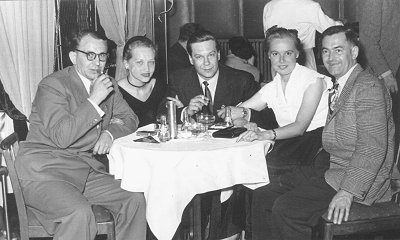
Heinz Schleuss in the centre; I am on the right.
|
| The development of the Strawberry Lane site continued, but not without
some problems from Wednesfield Council. In 1960 they announced that they
were going to make up Strawberry Lane (which was an unmade cart path)
and charge us £25,000 for the privilege. I refused to pay on the grounds
that it was a publicly maintainable highway, it having been a highway
before the passing of the Highways Act 1835.
After months of exploring
local museums and record offices I found, at Somerset House, an old LMS
railway map which showed the highway; the map was dated
1934. Eventually the road was made up, in about 1965/66. In
1965 the Council again caused problems, threatening to compulsorily purchase 10 acres of our land.
But I applied for, and got, planning permission to build 30 factory
units and set up Neachells Development Limited to carry out the work.
We continued trading very strongly in the 1960s and built a lot of our
own equipment. Here are some examples from a catalogue of 1962-3,
which listed our spare parts for Caterpillar, International Harvester
and Allis Chalmers: |
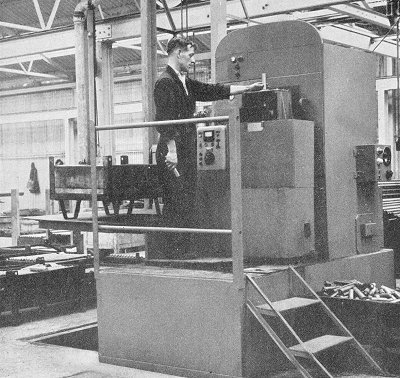 |
Electro Hardening of Track Pins. |
| Sprocket and Idler Hardening. |
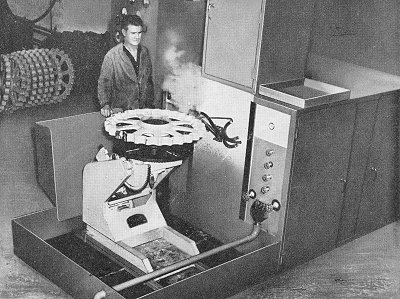 |
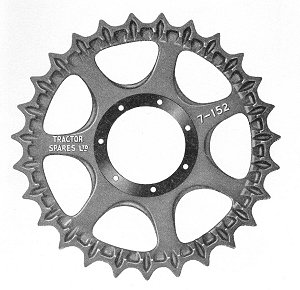 |
A sprocket for an International Harvester. |
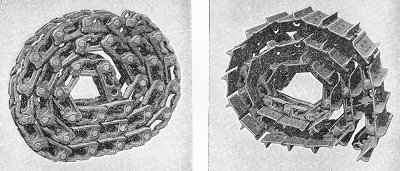
Track chain and track assembly for an International
Harvester.
| In 1965 Bob Sneath borrowed £1,000, purchased old one arm bandits,
renovated them and put them out for hire. This was the birth of
Alpha Automatics Limited, which was incorporated on 20th October, 1965. |

In 1966 I set up a company Power Grip Limited, which had the UK concession
for Bridgestone Off Road Tyres, and which also sold Tokio Earth-Mover
Tyres.
This company was properly registered but both Goodyear and Uniroyal
told us that they had exclusive rights to the name "power
grip". |
 |
| Strangely enough both companies agreed to pay us the
£200 cost of reprinting our stationery. We changed the
company’s name to Earthmover Tyres Limited. After all, we
had been paid twice for doing so. |
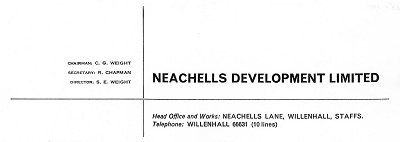 |
The same year we purchased, from a Mr. Wood of Green and Russell, Iron
Foundry, Neachells Lane, a parcel of 7.4 acres of rough land alongside
Watery Lane.
We got planning permission for 26 factories on this site. |
| And that year, too, we bought Mackay Industrial Equipment Limited, along
with its stock of Allis Chalmers spares and plant, and land and
buildings at Feltham. When Allis Chambers were taken over by Fiat we
sold all the spares back to the States, and sold the land and buildings
to the National Coal Board. |
| In 1967 I made an offer for the entire stock of motor cycle
spares of the Royal Enfield Cycle Company. I thought another bit
of motoring history might come to Wolverhampton. But it turned
out that we had been asked to bid simply to use our offer to bring
pressure on another prospective purchaser. The ploy worked:
the Indian Government bought Royal Enfield. In 1967 Decca Ltd. took a 25 year lease of our office block and six
bays, later expanding that to 13 bays. Thus Wolverhampton became a
centre for the production of colour television sets, not only under the
Decca name but also for Granada, Phillips and Telefunken. (They vacated
these building in early 1979 and left them empty for 13 years).
As our
office block was now leased to Decca we got planning permission for a
new one at the foot of Neachells Lane railway bridge. In 1969 we sold
the 30 factories and land in Strawberry Lane to David Charles of
Birmingham. |
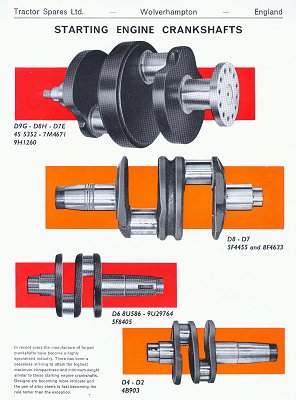
A page from one of our catalogues.
|
 |
|
 |
|
 |
Return to
SUN-TRAC |
|
Return to
the index |
|
Proceed to
One Arm Bandits |
|